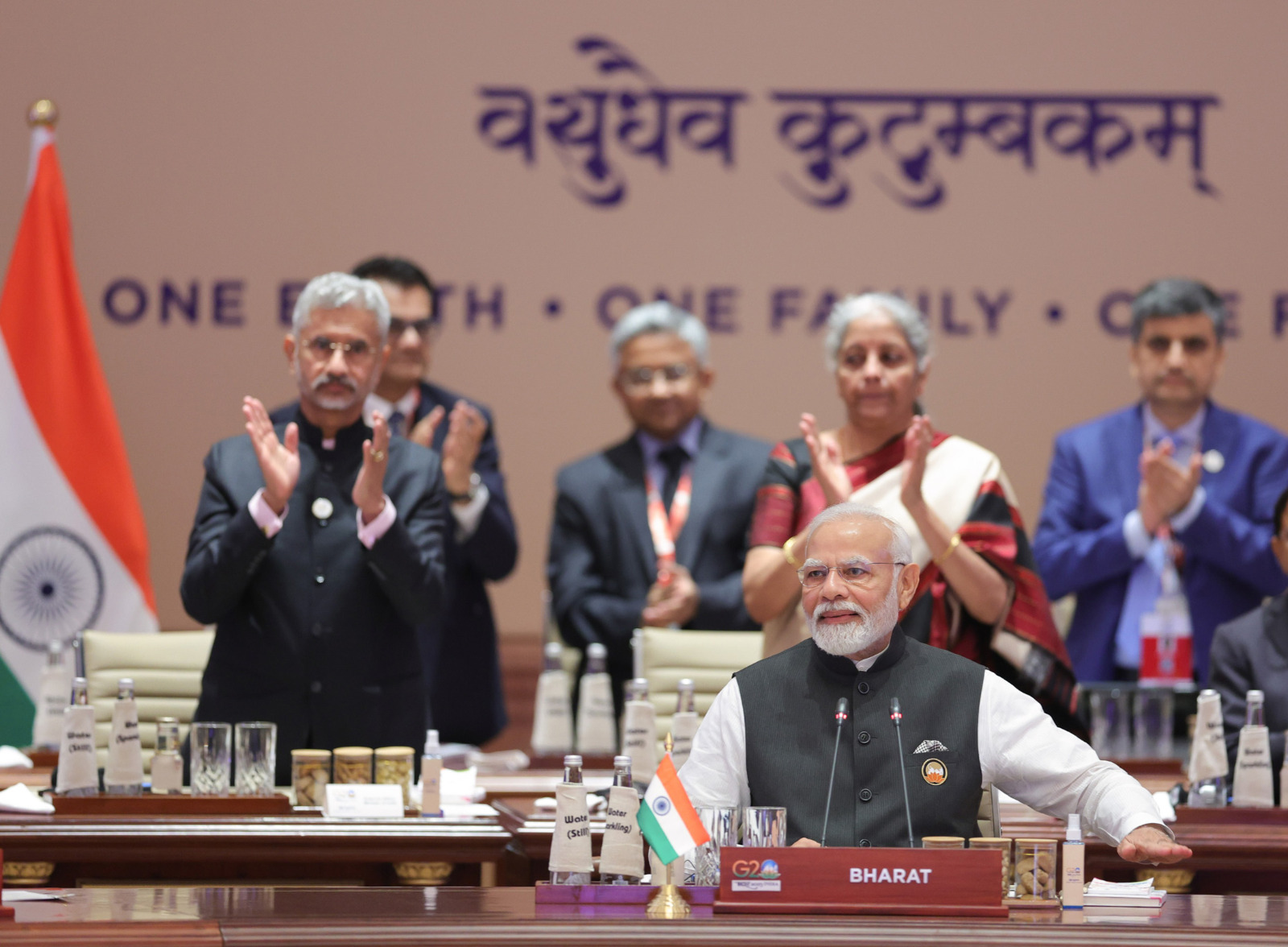The agreement may be ambitious and difficult to achieve, but it will drive the future global political discourse
After more than four decades of global leaders' united statement in 1987 to define the future as “development that meets the needs of the present without compromising the ability of future generations to meet their own needs,” global governance finally reached a consensus in 2013-16 that took shape in the UN Sustainable Development Goals (SDGs) as a common target for 2030. During its G-20 presidency, India recalibrated the goalpost by structuring three sessions: Common Concerns as One Earth, Common Challenges as One Family, and Common Endeavor into One Future. The strategic use of “One Earth, One Family, and One Future” should ideally redefine global governance into a framework of Vasudhaiva Kutumbakam.
By doing so, G-20 fundamentally reshaped the Brundtland Commission report titled ‘Our Common Future’, structured around three critical parts: Common Concerns, Common Challenges, and Common Endeavours. While the Brundtland Commission report achieved global consensus on environment and economics with equity in defining sustainable development, G-20 constellated to mitigate political and economic inflicted divide due to an unprecedented overlap of Conflict, COVID-19, and Climate Change, even though the preamble of the UN SDGs consists of peace, prosperity, partnership, people, and planet.
While the G-20 and the report of the World Commission on ‘Environment and Development: Our Common Future’, also called the Brundtland Commission report, succeeded due to an anthropocentric or human-centric approach, the G-20 presidency clouds with ambiguity and disagreement were cleared with a strategic win. Despite human-centric common agendas in and around the UN SDG, contentions arose due to subdued ecologies marred by the economic footprints of the global powers. China and Russia's alignment with the opposition of America, Australia and Japan, while India mediated peace, prosperity, and partnership, reflects that the world is more divided than in the pre-sustainable development era.
India strategically aligned ‘peace’, one of the five principles in the preamble of UN SDGs, as a successful ‘political tool’ in achieving consensus over a joint statement. The philosophy of Vasudhaiva Kutumbakam was finally converted into the framework in the 29-page G-20 statement encompassing nine critical areas. While it starts with Strong, Sustainable, Balanced and Inclusive Growth to set the context for accelerating progress on SDGs, it graduates to capture, “green development pact for the future; multilateral institutions for the 21st Century; technological transfer and digital public infrastructure; international taxation; gender equality and empowering all women and girls; financial sector issues; countering terrorism, money laundering; and creating a more inclusive world”. These elements were difficult even for the divided position of global powers to refute One Earth, One Family and One Future. One may question the conspicuous miss about the naming of a specific country, however, the G20 statement with 10 times usage of 'peace', five times 'conflicts' and five times the use of word 'war', with Point 16 stating ‘Today’s era must not be of war’. More importantly, the prominent mention of Ukraine four times in the G-20 statement is more explicit than the implicit message.
G-20 negotiations remind us of ‘Limits to Growth’, the well known book published in 1972 as an attempt by The Club of Rome to unite the world on ‘Common’. The book categorised the predicament of mankind's quest for structured responses to growing worldwide complexities and uncertainties as “World Problematique”. It stated that ‘even if earth’s physical systems can support a much larger, more economically developed population, the actual growth of the economy and the population will depend on such factors as peace and social stability, education and employment, and steady technological progress.” These factors were much more difficult to assess or to predict but helped the world to calibrate ‘common concerns, common challenges, and common endeavors’ into a common framework.
While the essential message remains the same, the 1970s and 1980s advocacy was to mainstream sustainable development in global and domestic politics; 40-50 years later, the paradigm of sustainability drives global policies and politics. The second important shift is that the bipolar (north-south) world has now turned into a more complex, divided, multi-polar world.
This fault-line is the global obsession with defining the marketization of national positions with little priority on consensus over common principles in global governance. The path towards Vasudhaiva Kutumbakam lies in universally accepted international government principles. With the inclusion of the African Union, technically G-20 is transformed into G-21. By doing so, India and the like-minded alliance have succeeded in setting the goalpost of One Earth, One Family, and One Future.
India seeded in G-20 and must pursue global advocacy that constitutes concerns for 195 countries. The agenda of five powerful nations cannot drive and divide international governance principles. In a worldwide market, the colonisation of power with the production of science, technology and innovation is essential; however, no power or nation gains strength without a market in developing or less developed countries. Market colonisation was the essence of the contest in G-20 and may remain a concern over Vasudhaiva Kutumbakam in future.
Post G-20, the relevance of Vasudhaiva Kutumbakam needs further extension by aligning alienated nations on the global map. The G-20 turning to G-21 may redefine aspirations and hope among the ‘consumer nations’ to voice against market colonisation. India needs to align the UN and G-20 within the ambit of globally agreed governance principles agreed on July 2, 2018 by the UN Economic and Social Committee, which endorsed 11 principles prepared by the UN Committee of Experts on Public Administration (CEPA) and UN DESA. The three critical nodes that constitute 11 principles under three broad categories; ‘effectiveness, accountability and inclusiveness’ can only be achieved when the powerful nations move from “My Earth, My Family and My Future" to “Our Earth, Our Family and Our Future” and that is embedded in Vasudhaiva Kutumbakam. In the global and domestic political debate, while the market and governments across the world need to be more effective and accountable, it’s the inclusivity that will glue consensus.
The G-20 agreement may be ambitious and difficult to achieve, but it will drive the future global political discourse. Days are not far when Vasudhaiva Kutumbakam, with the core principles of redefining a shared future, will unite the consumer nations on the global map to be the producer of power by the accumulation of local interests with little or no debt and divide.
Prof. Avanish Kumar is Dean, School of Public Policy and Governance & Center of Excellence and Faculty In-charge PGDM-PPM, Management Development Institute, Gurugram.

